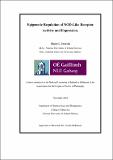| dc.contributor.advisor | McKernan, Declan | |
| dc.contributor.author | Feerick, Claire L. | |
| dc.date.accessioned | 2019-02-19T09:12:06Z | |
| dc.date.issued | 2018-11-19 | |
| dc.identifier.uri | http://hdl.handle.net/10379/14971 | |
| dc.description.abstract | NOD-like receptors (NLRs) are a family of intracellular pathogen recognition receptors involved in the innate immune response. NOD1 and NOD2 are the best characterised members of this family, and so are the focus of this research. These receptors have been linked to a wide range of chronic inflammatory diseases, including inflammatory bowel disease. Aberrant NOD1/NOD2 expression has been associated with these states of chronic inflammation. However, the mechanism underlying NOD1/NOD2 gene expression regulation has yet to be elucidated. Therefore, this thesis aimed to investigate whether epigenetic modifications play a significant role in regulating NOD1/NOD2 activity and expression. Epigenetic modifications are heritable patterns that surround the DNA and histones, altering expression of the underlying genes. DNA methylation and histone acetylation are the best characterised of these modifications and so their effects on NOD1/NOD2 were investigated in this thesis. The cell line models used to carry out this experimentation included; HCT116 intestinal epithelial cells and THP-1 monocytic cells. Pharmacological attempts were made to induce a hypomethylated, hyperacetylated or differentiated status, after which NOD1/NOD2 pro-inflammatory responses were quantified. Cells primed with a demethylating agent (5-Aza, 5-Aza-dC or DNMT3b-/-), or containing a DNMT3b genetic knockout (DNMT3b-/-) were found to be consistently more responsive to NOD1/NOD2 stimulation and had increased expression. Treatment with a histone deacetylase inhibitor (SAHA) or monocyte-to-macrophage differentiation (using PMA) exhibited less conclusive effects on NOD1/NOD2 activity and expression. In conclusion, the novel experimentation carried out in this thesis suggests for the first time that NOD1/NOD2 receptor activity and expression are possibly regulated directly by DNA methylation. Future experimentation, involving DNA methylation pattern analysis, could be carried out to confirm this finding. | en_IE |
| dc.publisher | NUI Galway | |
| dc.rights | Attribution-NonCommercial-NoDerivs 3.0 Ireland | |
| dc.rights.uri | https://creativecommons.org/licenses/by-nc-nd/3.0/ie/ | |
| dc.subject | NOD-Like Receptors | en_IE |
| dc.subject | Epigenetics | en_IE |
| dc.subject | DNA methylation | en_IE |
| dc.subject | Inflammation | en_IE |
| dc.subject | Expression Regulation | en_IE |
| dc.subject | Inflammatory Bowel Disease | en_IE |
| dc.subject | NOD1 | en_IE |
| dc.subject | NOD2 | en_IE |
| dc.subject | Medicine | en_IE |
| dc.subject | Pharmacology and Therapeutics | en_IE |
| dc.title | Epigenetic regulation of NOD-like receptor activity and expression | en_IE |
| dc.type | Thesis | en |
| dc.contributor.funder | Hardiman Research Scholarship, NUI Galway | en_IE |
| dc.local.note | This novel research aimed to investigate how levels and activity of certain proteins (NOD-Like receptors) are controlled. These proteins are involved in the initial immune response and have been linked to chronic inflammatory conditions e.g. Crohns’ disease. Findings uncovered here suggest that epigenetic patterns surrounding DNA are potentially playing a key role. | en_IE |
| dc.description.embargo | 2023-02-18 | |
| dc.local.final | Yes | en_IE |
| nui.item.downloads | 27 | |


